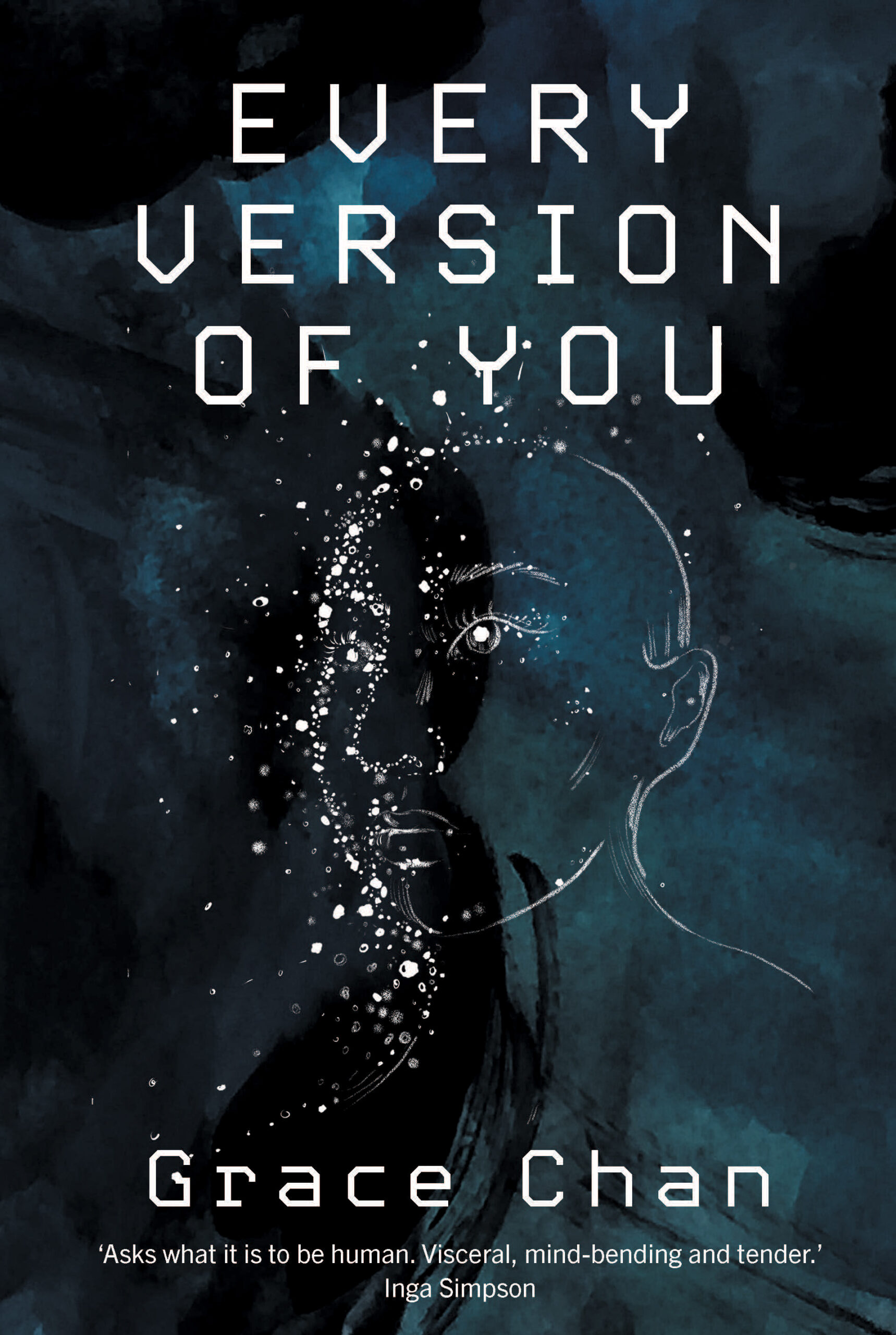
Grace Chan is a speculative fiction writer and doctor. Her writing explores brains, minds, technology, space, and narrative identity. Her short fiction can be found in Clarkesworld, Going Down Swinging, Aurealis, Andromeda Spaceways Magazine, and many other places. She has been shortlisted for the Aurealis Awards, the Norma K Hemming Award, and Viva la Novella.
The other version of Grace works in psychiatry. She has a longstanding interest in psychology, neuroscience, consciousness, empathy, ethics, and the mind-body relationship. Every Version of You is her first novel.
Following the publication of Grace’s debut novel, Writers Victoria Online Learning Administrator, Bianca Breen, chatted to Grace about Every Version of You,
how her research pursuits in psychiatry and neurology informed the novel’s speculative and philosophical dimensions, and the sense of the ‘real’ in online space.
Congratulations on the release of Every Version of You! Can you give us an inside peek into the novel?
Thank you so much. Every Version of You is a literary science fiction novel set in the late twenty-first century, when the world is migrating into a digital utopia. Tao-Yi and her partner Navin spend most of their time plugged into an immersive, consumerist virtual reality called Gaia, where they work, meet up with friends, eat, and travel.
When a new technology is developed to permanently upload a human mind to Gaia, Navin is compelled by the potential freedom and expansiveness this offers. But Tao-Yi stalls, held back by her relationship with her stubborn, sad mother, and her tenuous connections to the past.
It’s a story about technology, identity, love, migration, change, and what it means to be human.
What was the inspiration behind the story?
I started writing this story four years ago. At the time, I was thinking and feeling a lot of churned-up things about the transient nature of our lives—especially about passing relationships, how we draw closer and further to and from the people we love, like orbiting planets that only approach one another for a brief season. I was also pondering the nature of change—how we inevitably change so much throughout our lives, under the force of both internal motivations and external circumstances. You might even say that we’re a succession of different selves, stitched together by the threads of self-narrative.
I think writing Every Version of You was my way of coming to a sort-of peace with this. It was a way to immortalise the many stages of being that a person goes through, and the relationships that we share. Although all experiences are transient, they are permanent and hallowed, simply for having happened.
The idea of a two people in love, but who are torn in different directions by the technology of mind-uploading, came to me in a burst. It seemed like the perfect vehicle to explore these ideas.
What kind of research went into this novel, particularly regarding its technological/speculative aspects?
Luckily, I didn’t have to do too much extra research, mainly because I could draw on my medical training. I’ve always been especially interested in the brain and the mind. I was fascinated by neurology during my university days, and eventually pursued psychiatry training. Also, I highly recommend writing speculative fiction—you can extrapolate from current knowledge and make stuff up to fill in the gaps!
I thought a lot about how mind-uploading might look, feel, and work. How can we extrapolate from our current understanding of neural circuits to plausibly upload a human mind? A lot of this doesn’t require a hard scientific background specifically, just a lot of mulling and problem-solving and writing out the inconsistencies when your editors pick them up!

Alongside its futuristic plot, Every Version of You negotiates questions about cultural authenticity and intergenerational tensions in the age of globalisation. Was the relationship between Tao-Yi and her mother, between a digital future and an authentic past, informed by more present-tense concerns about what is ‘real’?
Yes, I think I was trying to grapple with what is real on both a personal and philosophical level. I lean more towards the perspective that what is real is subjective, unable to pinned down, and different for everyone. I don’t believe that what happens in virtual spaces is any less real than what happens in the physical world. Virtual spaces have just as much of an impact on our identity and relationships.
Tao-Yi and her mother are part of the Malaysian Chinese diaspora, which contains a spectrum of experiences. Some members of diaspora sustain strong connections to their homelands; others identify readily with their new countries. Tao-Yi’s experience is one of floating: she doesn’t have many stories from her past, and a lot of her connections, her family’s history, are truncated and unspoken. I think this is not an uncommon feeling for many children of migrants. You come into a new country with very little, and everything feels nebulous and untethered and perhaps a little unreal. Then, of course, there’s the cultural gap between different generations, which can be crossed at times but is impossible to close.
You have to then try to tether your identity to something. You mould yourself to fill the hole in your family or environment. For Tao-Yi, this involves caring for others as a mode of being, and being of benefit in a society that commodifies this. It’s not surprising, then, that the world of Gaia makes her feel even more adrift.
I find ‘cultural authenticity’ a rather confusing term. When you come from an immigrant family, you often feel that you can’t lay claim to any home, that you only belong in an in-between space. Especially when you move into a Western-dominated society, there’s a pressure to perform your ‘cultural background’, and everyday interactions flatten you into two-dimensionality. I suppose I’m trying to say that your personal experience of your culture is valid and true—even if your customs are different, even if you’ve lost language. Inauthenticity, I think, springs from commodification and appropriation, alongside superficiality and a lack of empathy.
I could go off on a bunch of tangents, but I’d better stop there!
You’ve written in so many forms – games, creative-nonfiction, poetry, short fiction. Have you always wanted to write a novel, and what was the process like for you?
Thank you, but you give me too much credit! I’ve really only dipped my toes into games, creative non-fiction, and poetry—I have a lot to learn about writing in those forms.
I’ve wanted to write a novel since I was a kid. But a few years ago, I was inspired by speculative short fiction authors such as Ken Liu, Ted Chiang, Isaac Asimov, Ursula K Le Guin, and I started writing short fiction. I fell in love with it: the challenge of crafting a complete story in a small space, and the joy of being able to explore many ideas without committing to a novel.
Every Version of You started as a short story, which quickly grew into a novella. It was shortlisted for Viva la Novella. It didn’t win, but I received very thoughtful feedback that helped me turn it into a novel. I think this was the right move. There’s so much to explore—the boundless possibilities of new tech, different character arcs—that I wouldn’t have done the story justice in a shorter form. It needed the space of a novel to fully come to life. That includes the negative space—the breathing room, the stuff that’s left gently unsaid. I rewrote the novel several times, so there’s a lot of material that didn’t make it into the final version. It didn’t belong there, but I had to write it to better figure out what the story wanted to be.
Due scepticism aside, if you could invent an AI or piece of technology to improve one area of your life, what would it be?
This might sound nightmarish to some people, but I would like to have a personalised curator for my mind, who could organise all the books and articles and television shows and movies I want to consume, and sort them in terms of my day-to-day preferences, mood, and schedule. Come across an interesting book in a bookstore? Hand it over to your curator to shelve in your mental library! Stuck in a waiting room for an hour? Have your curator bring up that science fiction novella you’ve been meaning to read for ages! They would also keep track of everything I’ve read and watched, with my reflections and annotations attached—and I could look things up at any time.
You can find Grace online at gracechanwrites.com, and follow her on Twitter at @gracechanwrites and Instagram at @gracechanwrites. Every Version of You is available now via Affirm Press.
